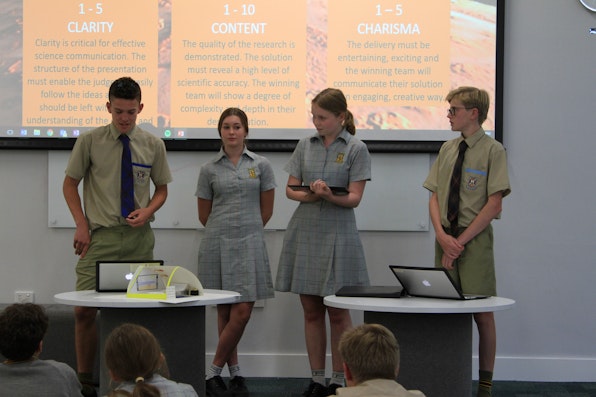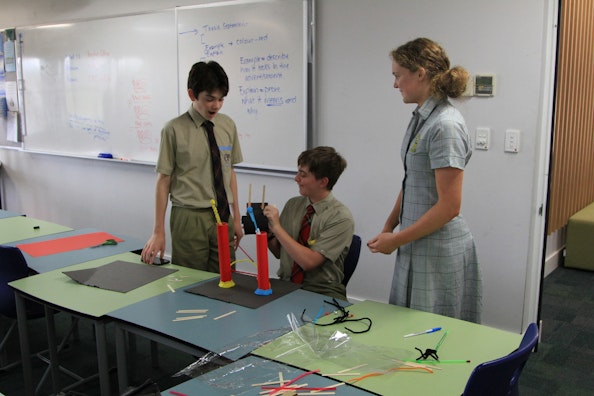Mission to Mars
Sending humans to Mars remains a phenomenal undertaking by all standards and, as such, presents very real risks and challenges.
In collaboration with Penrhos College's MESH X programme, boys in the Year 10 Enrichment Programme travelled to Penrhos for a day of collaborative problem solving around the audacious idea of colonising Mars by 2031. Each term, the Year 9 and 10 Enrichment Programme features immersive, multi-disciplinary activities such as this that involve boys in challenging, collaborative, open-ended problems aimed at meaningfully connecting their learning to the world beyond the classroom.
The day began with an enlightening Q & A session with Mars One advocate Josh Richards who laid out the challenges of getting to Mars in riveting detail. He was then inundated with a battery of excellent student questions, one of which provocatively posed, is it ethical to be pouring money into this programme, when our planet needs all the support it can get? His response, that this notion was somewhat of a false dichotomy and space travel has led to some of the most helpful innovations we now take for granted. Problem solving our way to Mars may very well reveal the answers we need to sustain life on our planet into the future.
Josh has been shortlisted (final 100) to be one of the first teams to colonise Mars in 2031, as part of the Mars One initiative. He shared his divergent life journey, beginning with his studies in Engineering at Curtin University, then onto the mining industry as an explosives expert, a stint with the British Commandos, stand-up comedy and his current job, deep sea cave diver. All the while, going through the rigorous Mars One application process for a one-way ticket Mars (there is no return journey currently planned).
Following the Q & A, students formed collaborative teams, each researching a particular challenge under the following key themes associated with a mission to Mars; ethics, communication, power, travel, health and well-being. The day finished with a hands-on activity in which teams conceptualised, prototyped and presented some extremely novel and engaging solutions to Penrhos staff from multiple subject areas for critique.
David Epstein's provocative new book 'Range, Why Generalists Trump Specialists' challenges the old adage ' to attain genuine excellence in any area — sports, music, science, whatever — you have to specialize, and specialize early' . He presents a series of powerful example in support of this notion that ' to become a champion, a virtuoso or a Nobel laureate does not require early and narrow specialization. Quite the contrary in many cases. Breadth is the ally of depth, not its enemy. In the most rewarding domains of life, generalists are better positioned than specialists to excel.'
We know that our high ability students have the capacity to make complex inter-subject connections with relative ease and often seek 'top-down' understanding when learning (Clark 1997, Kanevsky and Geake 2004). As a result, they are well placed to develop the kind of 'range' Epstein is talking about, however, he argues that if we are to fully embrace this vision, we must do away with the folk wisdom, 'jack of all trades, master of none'. According to noted Israeli historian Yuval Harari (Sapiens, Homo Deus, 21 Lessons for the 21st Century), the most pressing challenges humanity faces are all complex and global in nature. They will require an understanding of these complexities and deep cooperation if we are to solve them. In short, we have a responsibility to help our high ability students develop the 'range' of skills they'll need to become the problem solvers of the future.
Josh Richards' approach to life is illustrative of this notion of developing 'range' as a person who is constantly learning new things. How does he do this, our students asked? By working hard to develop the transferable skills and mindsets he needs to confidently navigate his way from one unfamiliar situation to the next. This is why at Scotch we are in an enviable position to be already 4 years into developing an entire skills-based curriculum for our students in the form of the Approaches to Learning


Epstein, D. 2019. Range: Why Generalists Triumph in a Specialised World. Riverhead Books.
Holt, Jim. "Remember the '10,000 Hours' Rule for Success? Forget About It." The New York Times , The New York Times, 28 May 2019, www.nytimes.com/2019/05/28/books/review/david-epstein-range.html .
Kanevsky, L, & Geake, J 2004, 'Inside the zone of proximal development: Validating a multifactor model of learning potential with gifted students and their peers', Journal for the Education of the Gifted, vol. 28, no. 2, pp. 182-217
Mr
Sam Sterrett &
Mr
Steve McLean
Enrichment Coordinators